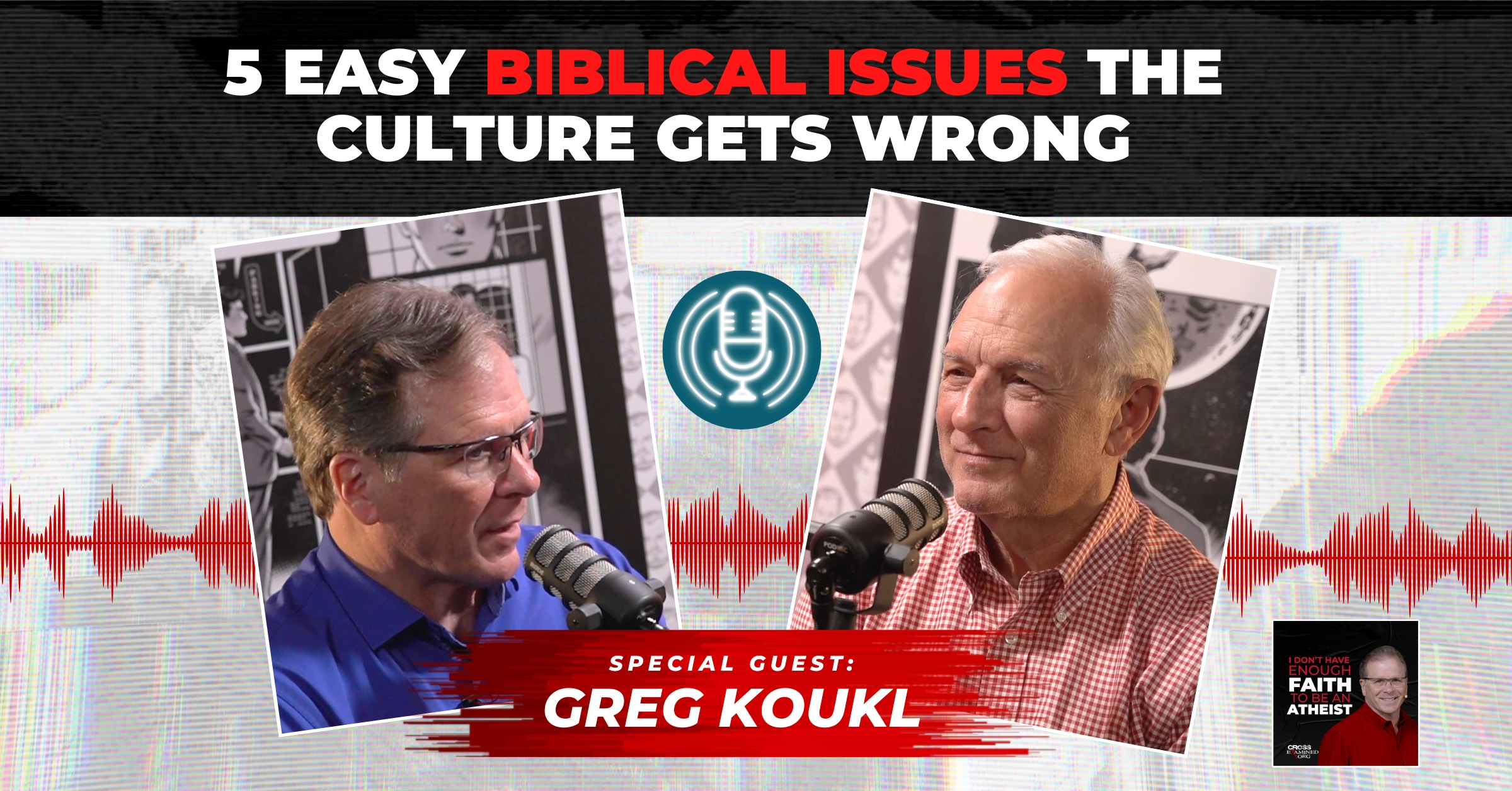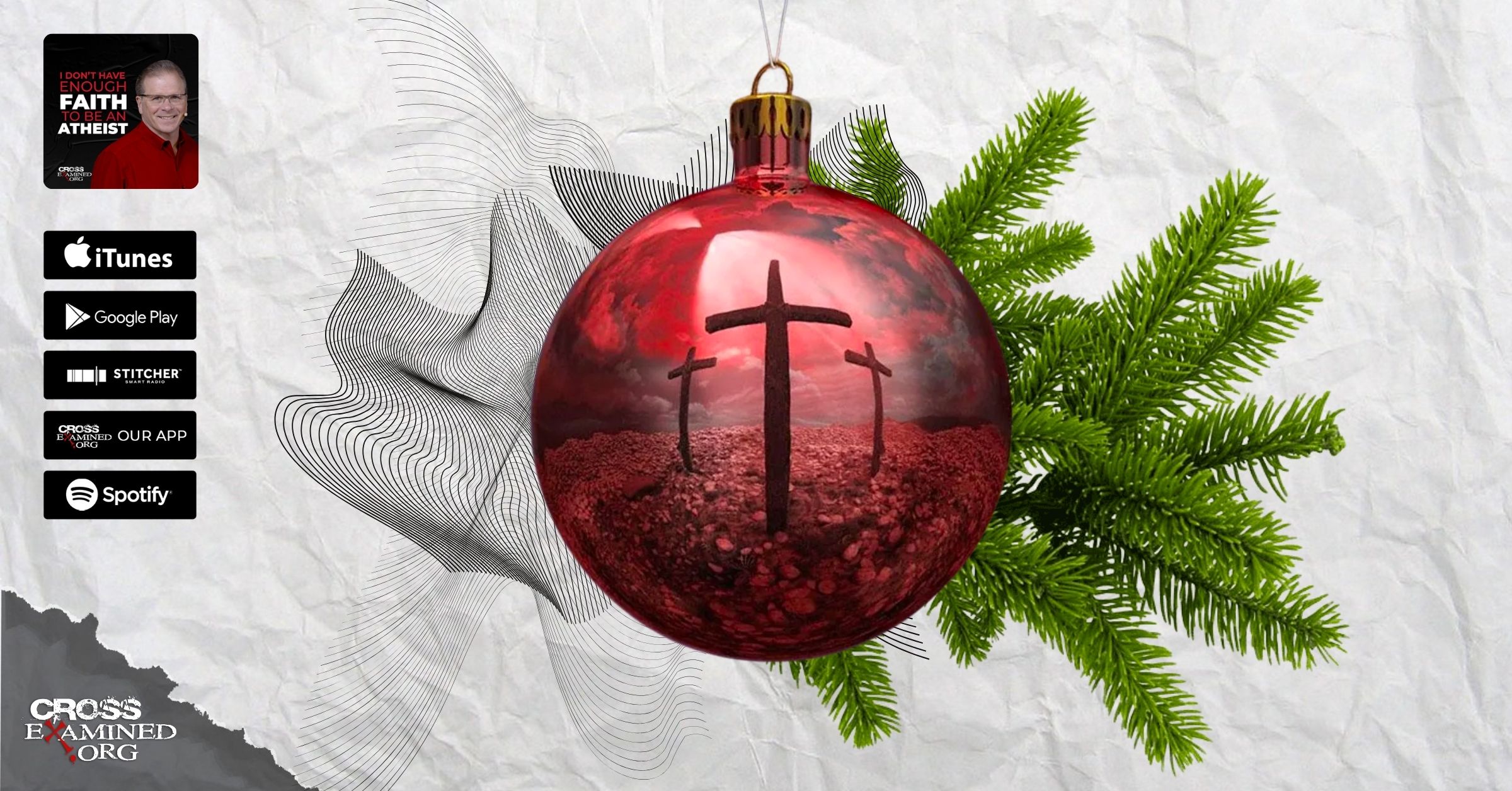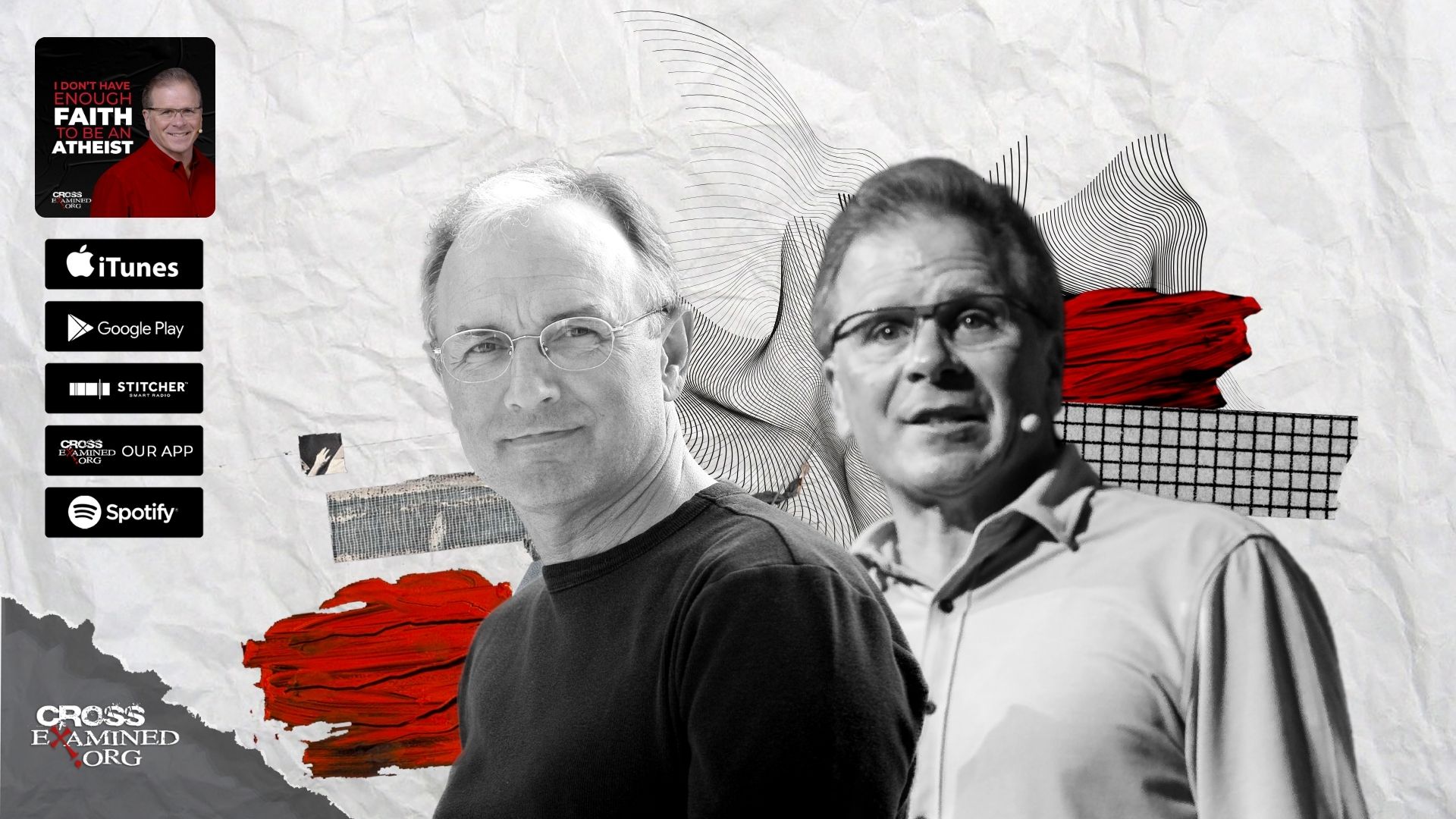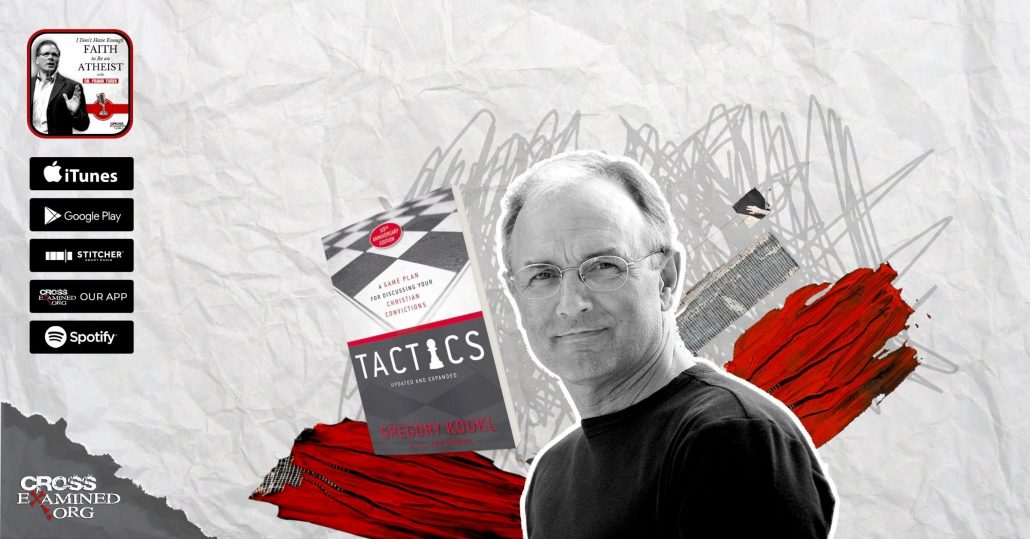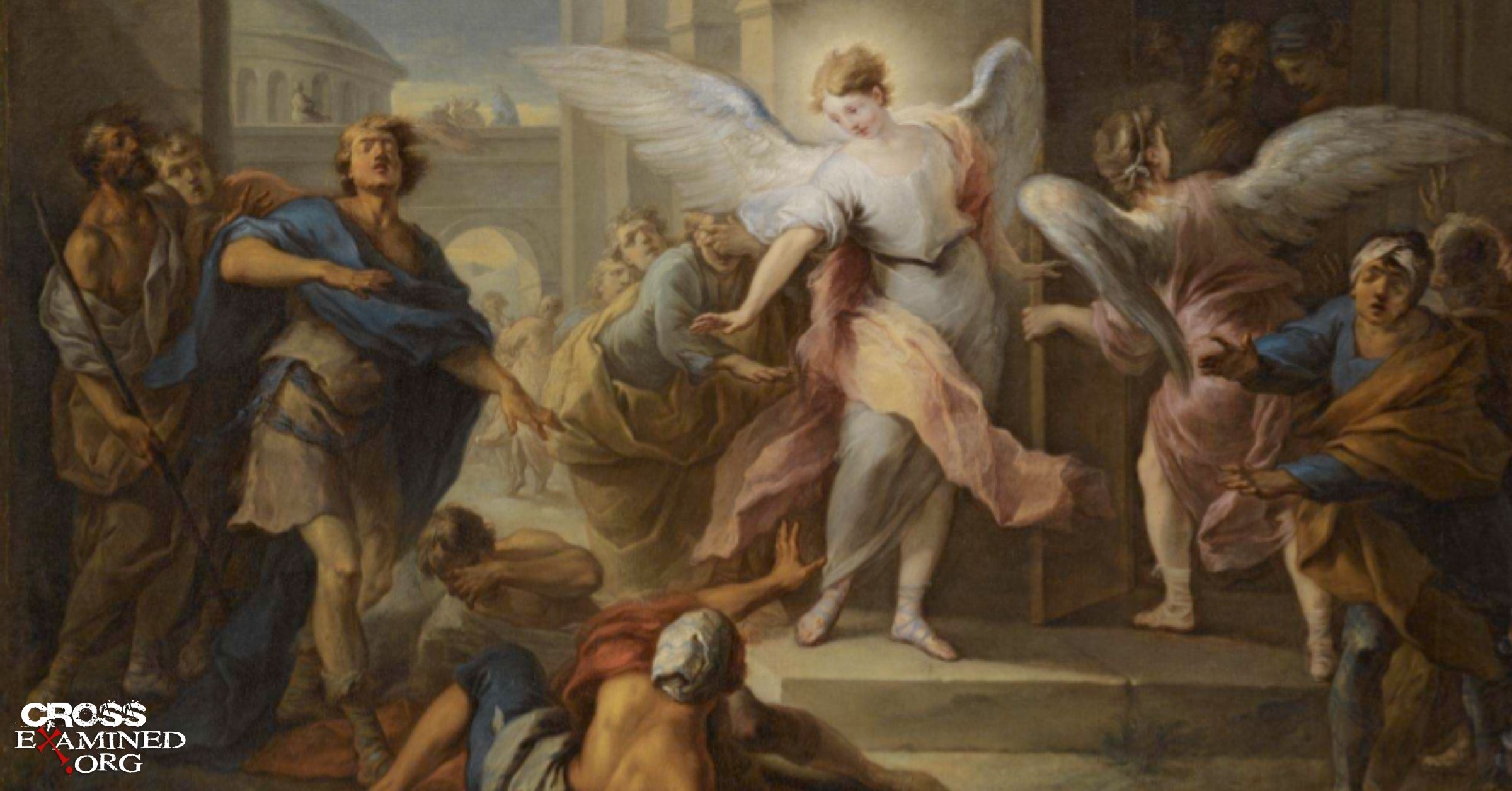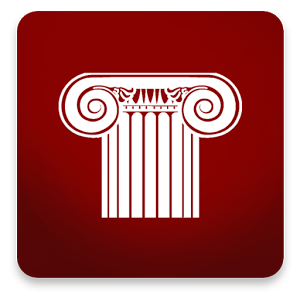By Greg Koukl
Why did God destroy Sodom and Gomorrah? Was it really because of the sin of inhospitality and not because of homosexuality, the greatest judgment found in the Bible outside of the book of Revelation?
People find what they want in the Bible. But if you look hard enough, you can find “biblical” support for reincarnation, Eastern religions, Jesus as a guru, divorce for any reason, and flying saucers. Every sect of Christianity uses the Bible to validate its claims, as do some who practice the occult.
It is not surprising, then, that a recent trend among biblical scholars holds that a careful reading of Genesis in its historical context provides no solid basis for concluding that the destruction of Sodom and Gomorrah has anything to do with homosexuality.
This view may seem far-fetched to biblical conservatives, but it is taken very seriously in academic circles. It represents a significant challenge to the average Christian who finds in the Genesis account a direct condemnation of homosexual behavior.
My goal is to provide an answer to that challenge. I have no interest in defaming, insulting, offending, attacking, lashing out, denigrating, much less belittling a group of people. I just want to determine one thing: why did God destroy those two cities? Did it have anything to do with homosexuality itself? Simply put, what was the sin (or sins) of Sodom and Gomorrah?
Genesis 18:16-19:29
Although the context of the story in question begins in Genesis 18:16 during God’s conversation with Abraham by the oaks of Mamre, the details of the encounter in Sodom are found in Genesis 19:4-13:
They had not yet gone to bed, when the men of the city, the men of Sodom, surrounded the house, both young and old, all the people without exception. And they called to Lot, and said to him, “Where are the men who came to you tonight? Bring them out so that we may know them.” Then Lot went out to them at the entrance and shut the door behind him, and said, “My brothers, I beg you not to do wickedly. Behold, I have two daughters who have not known a man; let me bring them out to you and do with them as seems good to you; but do not do anything to these men, for they have come under my roof.” But they said, “Stand aside!” And they said, “This man came as a stranger, and is already acting as a judge; now we will deal worse with you than with them.” And they rushed at Lot and were about to break down the door, but the two men put out their hands and brought Lot into the house with them, and shut the door. And they struck the men who were at the entrance of the house with blindness, from the smallest to the greatest, so that they were wearied trying to find the entrance.
Then the two men said to Lot, “Who else do you have here? Your sons-in-law, your sons, your daughters, and whoever you have in the city—get them out of this place, for we are going to destroy this place, for its outcry has become so great before the Lord that the Lord has sent us to destroy it.”
What was the sin of Sodom and Gomorrah? Why did God destroy the two cities? The traditional view is that homosexuality was the primary offense (“I beg you, my brothers, do not act wickedly.”).
Yale historian John Boswell offers four possible reasons for the destruction of Sodom:
(1) The Sodomites were destroyed because of the general wickedness that prompted the Lord to send angels into the city to investigate in the first place; (2) the city was destroyed because the people of Sodom had attempted to rape the angels; (3) the city was destroyed because the men of Sodom had attempted to engage in homosexual relations with the angels…; (4) the city was destroyed because of the inhospitable treatment of the visitors sent by the Lord. [1]
John Boswell thinks that explanation (2) “is the most obvious of the four,” although it has been “widely ignored by biblical scholars” [2] . Boswell expands on explanation (4), which he seems to favor as the most consistent with “modern scholarship” since 1955:
Lot was violating the custom of Sodom… by welcoming unknown guests into the city walls at night without obtaining permission from the city elders. When the men of Sodom gathered together to demand that the strangers be brought out before them “so that they might know them,” it only meant that they wanted to “know” who they were, and consequently, the city was destroyed not because of sexual immorality, but because of the sin of inhospitality to strangers [3] .
The Englishman D. Sherwin Bailey also makes this argument in Homosexuality and the Western Christian Tradition (1955). The men of Sodom only wanted to question Lot’s guests to see if they were spies. The sin of gang rape was also in view, not homosexuality. In a broader sense, the men of Sodom were inhospitable to Lot’s guests.
Apparently it did not occur to Boswell that possibilities (2) and (4) seemed to be in conflict. If “meeting” the angels basically means questioning them, then there is not an attempt at rape, but an attempt at interrogation. If, on the other hand, the men intended to have sexual relations with the visitors (according to the traditional view) and are guilty of attempted rape, then the interrogation explanation must be abandoned (as the interpretation of Boswell’s above summary with respect to the views of modern scholarship is somewhat incoherent).
Some of these explanations, however, are not mutually exclusive and may have been influenced differently. For example, the general wickedness of Sodom and Gomorrah (1) may have included rape (2) and/or inhospitality (4).
My primary interest here is to determine whether the biblical record indicates that (4) homosexuality was a significant factor.
Text clues
Why did God destroy Sodom and Gomorrah? We can find clues not only in the Genesis account, but also in the books of the prophets and in 2 Peter and Jude in the New Testament. These give us insight into the way ancient Jewish thinkers, steeped in Jewish culture, understood these texts.
First, Sodom and Gomorrah were judged for a serious sin. Genesis 18:20 says, “The cry of Sodom and Gomorrah is great, and their sin is exceedingly grievous.” In fact, not even ten righteous people could be found in the city.
Second, it seems that the judgment of these cities was to serve as a lesson to Abraham and others that wickedness would be punished. In 2 Peter 2:6 we see that God condemned and destroyed the cities as an “example to those who would live ungodly afterward.”
Third, Jude and Peter describe the unique qualities of sin. Jude 7 portrays the activity as “they became corrupt” and went after “strange flesh” [4] . Peter wrote that Lot was “overwhelmed by the sensual conduct of unchaste men,” and “from what he saw and heard as he lived among them, he was daily tormented in his righteous soul by their unrighteous deeds.” They are “those who walk after the flesh in its corrupt desires and despise authority” (2 Peter 2:7-10).
Fourth, there are 27 references outside Genesis to the city of Sodom. It is the emblem of gross immorality, the deepest depravity, and great judgment.
Gathering the biblical evidence gives us a picture of the offense of Sodom. The sin of Sodom and Gomorrah was a grievous, continual, debauched, sensual act that Lot saw, heard, and was tormented by as he witnessed it day after day. It was an act in which the inhabitants gave themselves over to their corrupt desires, going after strange flesh, ultimately bringing upon themselves the greatest judgment found in the Bible outside of the book of Revelation.
What do we know about the behavior of the men of Sodom and Gomorrah that fits this description?
Just a couple of questions
Was the city destroyed because the men of Sodom attempted to rape the angels (option (2) above)? The answer is obviously no. God’s judgment could not have been for the rapacious attempt itself, since His decision to destroy the cities was made days before the encounter (see Genesis 18:20). Furthermore, Peter makes it clear that the evil acts were ongoing (“day after day”), not a one-time incident. The cry had already gone up before God for some time [5] .
Was it merely an interrogation? Although the Hebrew word “yada” (“to know”) [6] has a variety of nuances, the New Living Translation appropriately translates it as “to have sex” [7] . Although the word does not always have sexual connotations, it often does, and this translation is more consistent with the context of Genesis 9:5. There is no evidence that a harmless interview was what the men of the city had in mind. Lot’s response—“I beg you, my brothers, do not act wickedly”—makes it clear that they had other intentions.
Furthermore, the same verb is used in the immediate context to describe daughters who have not “known” a man and who were offered to the crowd instead of the visitors. Are we to understand Lot here as saying, “Please do not question my guests, but rather speak to my daughters who have never been interviewed”?
Did God judge Sodom and Gomorrah because of inhospitality? Is it true that God’s judgment was not because of homosexuality per se, but because the men of the town were not courteous to the visitors, violating sacred customs by attempting to outrage them? Serious questions arise if we make a couple of observations.
First, the implication itself is strange. To say that the men of Sodom were inhospitable because of the attempted rape is like saying that a husband who has beaten his wife is an insensitive spouse. That may be true, but it is hardly an important observation given the seriousness of the crime.
Second—and this has more to do with textual evidence—it does not fit the collective biblical description of the behavior that provoked God’s wrath: perverted, lawless, sensual behavior that Lot saw and heard day after day, in which men went after strange flesh.
Third, are we to believe that God wiped out two entire cities just because they had bad manners, even granting that such manners were more important then than now? There is no textual evidence that inhospitality was a capital offense. Yet homosexuality was punishable by death in Israel (Leviticus 18:22; 20:13). Did God overlook the capital offense, and yet wipe out two entire cities for an evil that is nowhere listed as a serious offense?
The only reason that fits
The prevailing modern view of the sin of Sodom and Gomorrah is that the attempted rape of Lot’s visitors violated the high code of Middle Eastern hospitality (19:9). However, this inhospitality is an inference, not a specific point made in the text itself.
Moreover, the charge of inhospitality depends on—and is overshadowed by—the grave crime of rape, though neither of these could be the sin of Sodom and Gomorrah because God had decided to judge the cities long before they were committed. What choice is left? Only one.
We know that the men of Sodom and Gomorrah were homosexuals, “both young and old, all the people without exception” (19:4), to the point of despising available women (19:5-8). They even persisted after being struck with blindness (19:11). These men were totally given over to an overwhelming passion that did not abate despite being supernaturally blinded by angels.
Homosexuality fits the biblical details. It was the sin that represented the flagrant wickedness of Sodom and Gomorrah—the “gross,” “ungodly,” “wicked,” “sensual conduct of the profligate men” that tormented Lot as he “saw and heard” it “day after day,” the “perverse desire” of those who followed “strange flesh.”
In their defense, some might cite Ezekiel 16:49-50: “Behold, this was the iniquity of your sister Sodom: Arrogance, plenty of bread, and complete idleness were her and her daughters; yet they did not help the poor and needy, but they were haughty and committed abominations before me [8] . And when I saw it, I put them to death.” There is no mention of homosexuality here.
Clearly, the overall wickedness of Sodom and Gomorrah was great. That is not in question. Our interest here is whether homosexuality was part of that wickedness. Our analysis of Genesis reveals that homosexuality was the primary behavior in question in that passage. Ezekiel simply lists additional sins. The prophet does not contradict Moses, but rather gives more details.
Pettiness and arrogance alone did not attract God’s wrath. Ezekiel headed the list of crimes with the word “abominations.” This word brings us back to homosexuality. The behavior that Moses refers to in Genesis 18 and later describes in Leviticus as “abomination” in the eyes of God.
Levitical
The Mosaic Law has two explicit citations regarding homosexuality. Leviticus 18:22 says, “You shall not lie with a male as one lies with a woman; it is an abomination” [9] . It is an abomination [toebah] [10] . Leviticus 20:13 says, “If a man lies with a male as one lies with a woman, both of them have committed an abomination [toebah]; they shall surely be put to death; their bloodguilt is upon them.”
John Boswell offers the most common rebuttal to what appears to be the obvious biblical prohibition of homosexuality:
The Hebrew word “toebah,” here translated as “abomination,” typically does not mean something intrinsically evil, such as rape or theft… but rather something that is ritually unclean for Jews, such as eating pork or engaging in sexual relations during menstruation, both of which are prohibited in these same chapters. [11]
As implied, Leviticus is not where we generally go for moral instruction. The sections cited deal with the worship service: sacrifices, priesthood, ceremonial washings, etc. These instructions have to do with ritual purity, not moral purity. A Jew who observed these laws could not worship after ceremonial defilement until he had cleansed himself to perform the ritual.
Others have pointed out that many details of the Mosaic law are archaic. Who cares about mixing wool with linen (Deuteronomy 22:11)? The death penalty itself does not mark homosexuality as particularly abhorrent. Disobedience to parents was also a capital offense, as was gathering firewood on the Sabbath, and yet no one considers these things punishable offenses today. [12]
This answer is riddled with inconsistencies. First, even if this prohibition were restricted only to ceremonial purity and worship, then it would apply only to Jewish clerics. However, many who use this approach see no problem with homosexual rabbis and defend such “diversity” as a religious virtue. On the other hand, if the Torah’s prohibitions no longer apply at all, then the difference between the ceremonial and moral aspects of Mosaic law is moot; none of it applies anyway.
Second, it is a grave mistake to conclude that if something in the Torah no longer applies, then nothing is applicable. Jewish thinker Dennis Prager observed: “It is one thing not to carry out a Torah punishment, and quite another to declare that a Torah sin is no longer a sin.” [13] [emphasis in original]
Third, it is true that much of the law seems to deal with religious activity rather than universal morality. However, this observation alone is not sufficient to dismiss the Torah as a source of obligatory moral instruction altogether. Ceremonial and moral purity are not always distinct from one another.
Here, context is king. Note where the verses fit in. The “toebah” of homosexuality is found between adultery (18:20), child sacrifice (18:21), and bestiality (18:23). Was Moses saying that if a priest committed adultery, had sex with an animal, or burned his son on the altar to Molech, he must make sure to wash before coming to the temple?
More to the point, these sections were not addressed to the priests, but to all the “children of Israel” (18:2, 20:2). In addition to the prohibitions regarding adultery, child sacrifice, and bestiality already mentioned, Moses also prohibited spiritism (20:6) and incest (20:12).
The conclusion of Leviticus 18 contains these words:
Speak to [the “children of Israel” (v. 2)], but as for you, you shall keep my statutes and my laws and you shall not do any of these abominations, neither the native nor the stranger residing among you; for the men of this land who were before you have done all these abominations, and the land has become defiled. (18:26-27)
Moses spoke just as clearly as in Genesis. The cities of Sodom and Gomorrah were guilty of many things, but chief among them was the sin of homosexuality.
In this section of Leviticus, God gives instructions not only regarding ceremonial purity, but also commandments that were to be observed by every Jew and even by every visitor.
Homosexuality was a sin for Jews. It was also a sin for Gentiles who visited Jews (“strangers”). It was even an abomination that defiled the land when pagan inhabitants in Canaan practiced it long before the Jews arrived.
Homosexuality is a defiling sin, no matter who practices it. It has no place before God among any people, in any age, neither before nor now.
Grades
[1] John Boswell, “Christianity, Social Tolerance, and Homosexuality” (Chicago: University of Chicago Press, 1980), p. 93.
[2] Ibid.
[3] Ibid.
[4] Some have suggested that the sin was seeking sexual union with angels (“strange flesh”). While this may be a possible interpretation, there is no indication that the men knew that Lot’s visitors were angels. Jude’s point is that the Sodomites, like the angels, “did not retain their original dominion, but abandoned their rightful dwelling” (v. 6). The “strange flesh”—the improper dominion—was not angelic flesh, but homosexual flesh.
[5] The answer that homosexual rape could still qualify as ongoing activity is unconvincing. Who would be the ongoing victims? They were not the men of the city.
Because of their sexual orientation, they were unlikely to be able to resist homosexual advances. Visitors would have to be targeted. But if those who did come were harassed “day after day,” I am sure that would put an end to the tourist business. The continuous supply of sexual candidates would quickly diminish once word got out, and many would avoid the area.
[6] Strong’s #3045.
[7] “To know” a person carnally, to have sexual relations… suj. and obj. Male (of sodomy) Gen. 19:5).” Brown, Driver and Briggs, The Brown-Driver-Briggs Hebrew and
English Lexicon (Hendrickson Publishers, Peabody ME: 1996), 394. See also Judges 19:22 ff.
[8] Curiously, this last sentence was overlooked in Boswell’s citation of the text.
[9] “Lie down” is the Hebrew word “shakab” and means “to lie down” (Strong’s #7901). In this case, it refers to sexual intercourse as in Genesis 19:32: “Come, let us make our father drink wine, and let us lie with him, that we may preserve our family through our father” (Brown, Driver, and Briggs, 1012).
[10] Strong’s #8441.
[11] Boswell, 100.
[12] It is curious that some choose to conclude that homosexuality was a lesser crime since it was no more offensive to God than gathering sticks on the Sabbath. Both were considered capital offenses. If you want to know how God really felt about this, look at the punishment He exacts.
[13] Dennis Prager, “Homosexuality, Judaism and Gay Rabbis,” The Prager Perspective, 3/1/97.
Greg Koukl is a Christian apologist, radio host, author, speaker, and founder of the Christian apologetics organization Stand To Reason. Greg received his M.A. in Philosophy of Religion and Ethics from Talbot School of Theology, graduating with high honors, and his M.A. in Christian Apologetics with honors from Simon Greenleaf University. He is an adjunct professor of Christian apologetics at Biola University.
Original Blog: http://bit.ly/2IplYdi
Translated by Natalia Armando
Edited by Maria Andreina Cerrada

